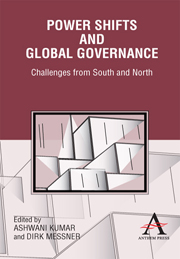Foreword
Published online by Cambridge University Press: 05 March 2012
Summary
This publication on power shifts and global governance challenges is the output of a collaborative effort of scholars and policymakers who are part of a network that is part of a programme called Managing Global Governance (MGG) that started in 2007. At three levels – theoretical frameworks of global governance, country and regional perspectives, case studies of global governance processes or architectures – the contributions to this book seek to explore global governance issues. For example, the book includes contributions that look at the role of civil society in global governance from a theoretical perspective, analyse regional security issues in Latin America, discuss China's engagement in Africa or develop proposals for possible summit and UN reforms.
The contributors to this book come from Brazil, China, India, Mexico, South Africa and Germany. It is probably fair to say that they all share the concern that global governance processes and structures are becoming increasingly important as we all need to protect global public goods or address global challenges such as climate change, international financial market stability, peace and security, while also focussing on jointly formulated development objectives such as the Millennium Development Goals (MDGs). I believe it is also fair to say that all of those who have contributed to this book are of the view that emerging or new powers such as China, India, Brazil, Mexico, South Africa and others should play a more prominent role in global governance processes and institutions.
- Type
- Chapter
- Information
- Power Shifts and Global GovernanceChallenges from South and North, pp. xiii - xviPublisher: Anthem PressPrint publication year: 2010

